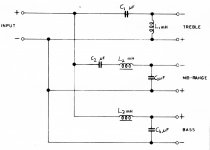Hi, I've got an issue with some new to me speakers that I'm hoping I can get help with here.
I was recently gifted an amplifier and a pair of speakers which has been sitting around for at least 10 years.
The amplifier that I was gifted wasn't anything special and had some issues so I got rid of it. I then bought a used Denon UPA-F88 as a replacement, it's small size perfect for the location I want to place it.
The speakers are Wharfedale KH-2110 towers. From the info I've been able to find on them, which isn't much, they're marketed as an home audio/theater and karaoke speaker.
When hooked up to the Denon amp the speakers sound muddy. This is a similar sound to the old amp, but that had more issues as well, the Denon amp sounds much better in general. Curious as to why the speakers sound so muddy I tested each speaker. These are bi-wire speakers and the bridges are installed fine. I removed the bridges to test the high and low drivers separately. What I found was that the low drivers, the midrange and bass sound great, the volume goes as high as I need it to, and doesn't have any issues from what I can tell. The high driver, the tweeter, sounds terrible. It makes sounds, but seems like its muffled, and the volume, no matter how high I turned up the amp doesn't get loud at all.
I think that's what must make the speaker sound muddy, the complete lack of highs, and just mid to low end playing at a higher volume.
Then, I pulled all the speakers and tested them. The nominal impedance is suppose to be 4 ohms, though I'm not sure what that means when testing the speakers directly.
All the midranges and woofers tested pretty much right at 4 ohm. The tweeters though both tested at 4.8 ohm.
I then hooked up the tweeters directly to the amp, turning the bass down and the treble up, with the volume at 0 to start with.
Both tweeters played music, but as I slowly raised the volume, one of them sounded like it was muffled.
The volume on both tweeters though was relatively low when compared to hooking up a midrange or woofer for comparison.
This has been the case too when the tweeters are installed in the speaker box. The tweeter volume relative to the midranges and woofers are very low. So much so, that even if the amp is turned up all the way the tweeters volume isn't room filling. Where the midrange and woofer volume even with the amp turn up only slightly can fill the room with sound.
Based on this, it seems to me that both the tweeters and crossovers might be bad. I'd say the tweeters for sure, but I'm not sure about the crossovers.
In order to test the crossovers I purchased some cheap 4 ohm tweeters to hook up so see if they play fine. They too played when installed played at a very low volume, but when played directly from the amp played at a normal volume. Based on this it seems to me that the crossovers are bad too.
So, it seems that I'll be needed new tweeters and new crossovers.
My question to you is what is the best way to go about this? Should I try to get the tweeters and crossovers repaired? Or buy replacement tweeters and crossovers? Or any other suggestions?
Wharfedale doesn't sell replacement parts for these speakers anymore so I can't get new stock from them.
Any advice or comment is greatly appreciated, thanks!
I was recently gifted an amplifier and a pair of speakers which has been sitting around for at least 10 years.
The amplifier that I was gifted wasn't anything special and had some issues so I got rid of it. I then bought a used Denon UPA-F88 as a replacement, it's small size perfect for the location I want to place it.
The speakers are Wharfedale KH-2110 towers. From the info I've been able to find on them, which isn't much, they're marketed as an home audio/theater and karaoke speaker.
When hooked up to the Denon amp the speakers sound muddy. This is a similar sound to the old amp, but that had more issues as well, the Denon amp sounds much better in general. Curious as to why the speakers sound so muddy I tested each speaker. These are bi-wire speakers and the bridges are installed fine. I removed the bridges to test the high and low drivers separately. What I found was that the low drivers, the midrange and bass sound great, the volume goes as high as I need it to, and doesn't have any issues from what I can tell. The high driver, the tweeter, sounds terrible. It makes sounds, but seems like its muffled, and the volume, no matter how high I turned up the amp doesn't get loud at all.
I think that's what must make the speaker sound muddy, the complete lack of highs, and just mid to low end playing at a higher volume.
Then, I pulled all the speakers and tested them. The nominal impedance is suppose to be 4 ohms, though I'm not sure what that means when testing the speakers directly.
All the midranges and woofers tested pretty much right at 4 ohm. The tweeters though both tested at 4.8 ohm.
I then hooked up the tweeters directly to the amp, turning the bass down and the treble up, with the volume at 0 to start with.
Both tweeters played music, but as I slowly raised the volume, one of them sounded like it was muffled.
The volume on both tweeters though was relatively low when compared to hooking up a midrange or woofer for comparison.
This has been the case too when the tweeters are installed in the speaker box. The tweeter volume relative to the midranges and woofers are very low. So much so, that even if the amp is turned up all the way the tweeters volume isn't room filling. Where the midrange and woofer volume even with the amp turn up only slightly can fill the room with sound.
Based on this, it seems to me that both the tweeters and crossovers might be bad. I'd say the tweeters for sure, but I'm not sure about the crossovers.
In order to test the crossovers I purchased some cheap 4 ohm tweeters to hook up so see if they play fine. They too played when installed played at a very low volume, but when played directly from the amp played at a normal volume. Based on this it seems to me that the crossovers are bad too.
So, it seems that I'll be needed new tweeters and new crossovers.
My question to you is what is the best way to go about this? Should I try to get the tweeters and crossovers repaired? Or buy replacement tweeters and crossovers? Or any other suggestions?
Wharfedale doesn't sell replacement parts for these speakers anymore so I can't get new stock from them.
Any advice or comment is greatly appreciated, thanks!
Attachments
-
 P_20220616_141104.jpg263.2 KB · Views: 274
P_20220616_141104.jpg263.2 KB · Views: 274 -
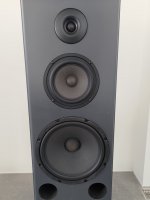 P_20220616_141112.jpg256.8 KB · Views: 208
P_20220616_141112.jpg256.8 KB · Views: 208 -
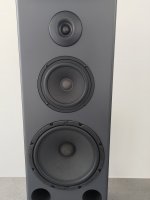 P_20220616_141118.jpg247.2 KB · Views: 206
P_20220616_141118.jpg247.2 KB · Views: 206 -
 P_20220616_140717.jpg415.8 KB · Views: 214
P_20220616_140717.jpg415.8 KB · Views: 214 -
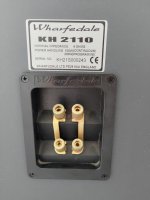 P_20220616_140713.jpg328.7 KB · Views: 215
P_20220616_140713.jpg328.7 KB · Views: 215 -
 P_20220620_105346.jpg458.6 KB · Views: 229
P_20220620_105346.jpg458.6 KB · Views: 229 -
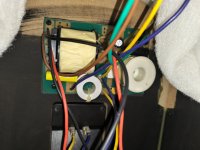 P_20220620_105324.jpg350.9 KB · Views: 256
P_20220620_105324.jpg350.9 KB · Views: 256 -
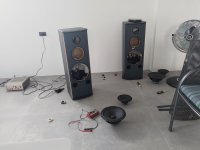 P_20220617_152544.jpg354.9 KB · Views: 248
P_20220617_152544.jpg354.9 KB · Views: 248 -
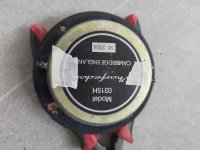 P_20220620_105417.jpg328.9 KB · Views: 245
P_20220620_105417.jpg328.9 KB · Views: 245
The tweeter capacitor in the crossover is a plastic film type which does not deteriorate with age, so the signal should get to the tweeter OK.
The tweeters themselves may contain ferrofluid (aids heat dispersion) which has dried up with age and is restricting the movement of the vibrating tweeter diaphragm.
On that evidence, substituting a new, but compatible, pair of tweeters should be sufficient.
i would check all the connections on and from the crossover boards and to the tweeters, looking for broken wires, loose connectors or bad solder joints
The tweeters themselves may contain ferrofluid (aids heat dispersion) which has dried up with age and is restricting the movement of the vibrating tweeter diaphragm.
On that evidence, substituting a new, but compatible, pair of tweeters should be sufficient.
i would check all the connections on and from the crossover boards and to the tweeters, looking for broken wires, loose connectors or bad solder joints
I think I may have found the problem!
Can you see the little mustard coloured disc next the red wire at bottom right?
This is a polyswitch which is intended to protect the tweeter from overload and which has probably gone high resistance.
Solder a short length of copper wire across it to short it out, so effectively removing it from the circuit.
Can you see the little mustard coloured disc next the red wire at bottom right?
This is a polyswitch which is intended to protect the tweeter from overload and which has probably gone high resistance.
Solder a short length of copper wire across it to short it out, so effectively removing it from the circuit.
Actually, the polyswitch is only visible in the second crossover photo. It seems to have been replaced by a wire link in the first photo.
Someone has been in there before.
I reckon both the tweeters and the polyswitches were damaged by severe overloading.
Replacing the polyswitches with wire links and replacing the tweeters should result in normal operation.
Someone has been in there before.
I reckon both the tweeters and the polyswitches were damaged by severe overloading.
Replacing the polyswitches with wire links and replacing the tweeters should result in normal operation.
I see a pair of Wharfedale 0315H tweeters currently on sale at auction and claimed to be in full working order.
https://www.ebay.co.uk/itm/40270679...7779&msclkid=b45c6580f8d71d1a0da907394806c404
https://www.ebay.co.uk/itm/40270679...7779&msclkid=b45c6580f8d71d1a0da907394806c404
Have you had time to investigate further, yowza?
Hi Galu, thanks for the all replies!
Unfortunately I haven't been able to touch the speakers since I first posted this thread, it's been a super busy week and I've had no free time.
Over the weekend though I plan on spending some time to figure out what the issue is.
What I'll do is what you recommend. I'll remove the polyswitches and replace them with wire links on the crossovers. You do mention that one of the crossovers looks like it's already been worked on based on the photos I posted, I'll keep that in mind when checking things out. I think I'll have to pull the crossovers out in order to get a good look at them and to work on them. When I do I'll take better pictures and upload those as well.
Good find on the tweeters! I've also been looking locally and haven't been able to find the exact ones, just similar ones. Although, I have been able to find speakers for sale in the same series (KH) that have the same tweeters, but the seller wants more money than I'm willing to spend. The eBay auction you linked is perfect, but unfortunately I'm located in Asia, and the seller doesn't ship outside of the UK.
I'll post an update towards the end of the weekend after I'm able to pull out the crossovers and get to work on them. This will be my first time doing something like this in a while so hopefully things go well.
Once again, thanks for the suggestions and help, much appreciated!
Thanks, I'll be heading off for a break commencing this weekend, but hopefully I'll still manage to follow your progress.
It's good that you have the cheap, but working, tweeters with which to test the crossover function.
It's good that you have the cheap, but working, tweeters with which to test the crossover function.
I've pulled the crossovers out from inside the speaker boxes and took many detailed pictures of them.
From what I can tell they both look good, but I've really got no idea of what could possibly be bad unless it would be super obvious.
Both crossovers do in fact have the polyswitches intact, and from what I can tell it doesn't look like anyone has modified them in the past, they appear to be original. I still intend to do what has been suggested, which is to remove the polyswitches and solder copper wire in its place.
I currently don't have the proper equipment to do this or else I would have already done so. I'll be making a quick trip my local hardware store and pick up a soldering iron and some solder, then get to work on it.
I'll update once I've done this, hopefully in the next day or two.
Thanks in advance for anyone with suggestions or comments! And especially Galu for helping me get started on this project!
From what I can tell they both look good, but I've really got no idea of what could possibly be bad unless it would be super obvious.
Both crossovers do in fact have the polyswitches intact, and from what I can tell it doesn't look like anyone has modified them in the past, they appear to be original. I still intend to do what has been suggested, which is to remove the polyswitches and solder copper wire in its place.
I currently don't have the proper equipment to do this or else I would have already done so. I'll be making a quick trip my local hardware store and pick up a soldering iron and some solder, then get to work on it.
I'll update once I've done this, hopefully in the next day or two.
Thanks in advance for anyone with suggestions or comments! And especially Galu for helping me get started on this project!
Attachments
-
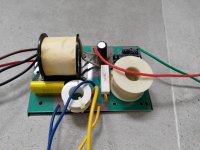 P_20220702_155510.jpg493.9 KB · Views: 120
P_20220702_155510.jpg493.9 KB · Views: 120 -
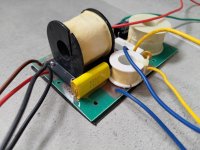 P_20220702_155515.jpg459.8 KB · Views: 80
P_20220702_155515.jpg459.8 KB · Views: 80 -
 P_20220702_155520.jpg505 KB · Views: 84
P_20220702_155520.jpg505 KB · Views: 84 -
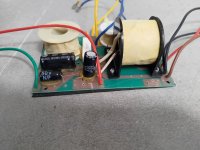 P_20220702_155531.jpg488.1 KB · Views: 100
P_20220702_155531.jpg488.1 KB · Views: 100 -
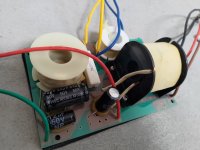 P_20220702_155540.jpg369.6 KB · Views: 93
P_20220702_155540.jpg369.6 KB · Views: 93 -
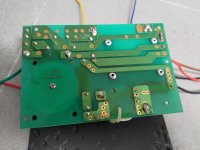 P_20220702_155551.jpg403.1 KB · Views: 84
P_20220702_155551.jpg403.1 KB · Views: 84 -
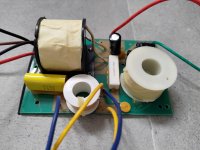 P_20220702_155733.jpg464.9 KB · Views: 92
P_20220702_155733.jpg464.9 KB · Views: 92 -
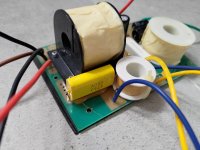 P_20220702_155736.jpg431.2 KB · Views: 98
P_20220702_155736.jpg431.2 KB · Views: 98 -
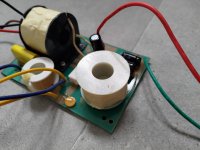 P_20220702_155743.jpg432.2 KB · Views: 83
P_20220702_155743.jpg432.2 KB · Views: 83 -
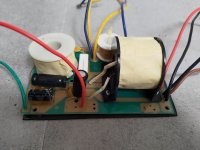 P_20220702_155753.jpg424.8 KB · Views: 79
P_20220702_155753.jpg424.8 KB · Views: 79 -
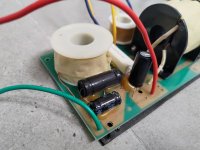 P_20220702_155757.jpg437.3 KB · Views: 83
P_20220702_155757.jpg437.3 KB · Views: 83 -
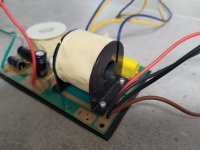 P_20220702_155804.jpg326.9 KB · Views: 74
P_20220702_155804.jpg326.9 KB · Views: 74 -
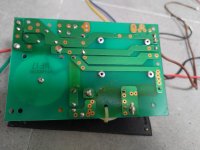 P_20220702_155813.jpg326.1 KB · Views: 92
P_20220702_155813.jpg326.1 KB · Views: 92
You mention one tweeter being bad. Then you suggest the crossovers are bad based on testing with another tweeter. Is it both now? While it's possible both crossovers are equally damaged it is less likely. If you want to test those however, you could start by drawing a schematic. This would help in a number of ways.
The original capacitors appear to have been replaced, in which case these crossover boards have been worked on.
The polyswitches, if good, should only have a resistance of around half an ohm. If they have been subjected to prolonged overload, then they will have gone high resistance.
@ Allen
I read it as there being a fault in both speakers. My guess is that both polyswitches and both original tweeters have been damaged due to overload - but we'll see.
The polyswitches, if good, should only have a resistance of around half an ohm. If they have been subjected to prolonged overload, then they will have gone high resistance.
@ Allen
I read it as there being a fault in both speakers. My guess is that both polyswitches and both original tweeters have been damaged due to overload - but we'll see.
Yes. I hope that OP can save time with proper diagnosing. Drawing a schematic would be extra work if unsure 😉
Last edited:
I have now opened the photos on my laptop and have looked closely at the rear views of the printed circuit boards.
I can see some stray whiskers of solder lying between the copper tracks on the first board image that are not present on the second board image.
You should remove them (scrape them off with a small screwdriver) as a matter of course.
The good news is that the tweeter capacitors are plastic film types, and so unlikely to be the source of the problem.
I can see some stray whiskers of solder lying between the copper tracks on the first board image that are not present on the second board image.
You should remove them (scrape them off with a small screwdriver) as a matter of course.
The good news is that the tweeter capacitors are plastic film types, and so unlikely to be the source of the problem.
P.S. There is no need to remove the polyswitches from the board in order to troubleshoot them.
Simply go to the rear of the circuit board and solder a short length of copper wire across them. This will short them out and effectively remove them from the circuit. These shorting links can then be easily removed if the polyswitches turn out not to be the problem.
If you have access to a multimeter, please measure the resistance across the legs of the polyswitches.
Simply go to the rear of the circuit board and solder a short length of copper wire across them. This will short them out and effectively remove them from the circuit. These shorting links can then be easily removed if the polyswitches turn out not to be the problem.
If you have access to a multimeter, please measure the resistance across the legs of the polyswitches.
Drawing a schematic would be extra work if unsure
The presence of 3 coils and 4 capacitors suggests the typical Wharfedale 3-Way crossover circuit which I've attached.
Attachments
The speakers are Wharfedale KH-2110 towers. From the info I've been able to find on them, which isn't much, they're marketed as an home audio/theater and karaoke speaker.
I read that the KH-2110 was designed with semi-professional applications in mind.
They are said to be ideal for live vocals such as in a Karaoke system.
If yours had a prior life in the above role, that would make my overloaded tweeter section theory a distinct possibility!
Here's the flyer for the Wharfedale KH Series:
https://media.djmania.net/manuales/pdf/wharfedaleKH.pdf
https://media.djmania.net/manuales/pdf/wharfedaleKH.pdf
Yes, both tweeters from my testing appear to be bad, but one seem worse off than the other.You mention one tweeter being bad. Then you suggest the crossovers are bad based on testing with another tweeter. Is it both now? While it's possible both crossovers are equally damaged it is less likely. If you want to test those however, you could start by drawing a schematic. This would help in a number of ways.
I arrived at this conclusion from swapping the tweeters between speakers and the same tweeter had an even more muffled sound than the other.
This was also true when hooked up directly to the amplifier for testing, that same tweeter sounded more muffled.
Both tweeters though operate at an extremely low volume in general, when installed in the speakers and when connected directly to the amp which leads me to think both are bad.
The cheap replacement tweeters I bought to test the crossovers with when installed in the speakers both operate at a low volume, but when connected directly to the amp operated at normal volume.
Based on those findings it's my guess that both the crossovers and tweeters are bad, with one tweeter being worse off than the other.
Hope that clears some of the confusion up.
Drawing a schematic is something I was going to try to do once I look into how to properly draw one since it's been years since I've done anything with electronics. But, I've also seen that Galu has uploaded a Wharfedale 3-way crossover. What I'll do is compare it to the ones I've got and make changes if necessary once to look into who to properly identify the parts of the crossover.
I'll reply to all of what you've said in this reply in order avoid multiple replies.I read that the KH-2110 was designed with semi-professional applications in mind.
They are said to be ideal for live vocals such as in a Karaoke system.
If yours had a prior life in the above role, that would make my overloaded tweeter section theory a distinct possibility!
I'll closely inspect the crossover and remove the stray whiskers of solder and anything else that might look suspect.
Okay, got it, no need to remove the polyswitches, just jump them. I still have yet to purchase a soldering iron and related supplies, once I'm able to I'll get on it.
I do however have a multimeter and have tested the polyswitches, one tests at 2.2 ohm and the other at 1.8 ohm.
You have mentioned that the polyswitches should only measure around 0.5 ohm so it seems that they have gone into high resistance. Your original guess of what could be the issue with the crossovers was correct!
I'll compare the Wharfedale crossover diagram you sent to the ones I've got. I do know immediately however that the crossovers I've got are bi-wire crossovers and I'm not sure if that make any difference since when used with the bridges both highs and lows are getting the same signal.
The previous history of these speakers is that they were only used in a home environment as a stereo karaoke setup. Here in Asia karaoke is a big thing so it's common for this type of setup in a home. These speakers were marketed here as karaoke speakers both for home use and professional use. The system was also connected to the TV as use as a sound system. Due to young kids and others who don't know how to operate an amp, many times the TV input or amp volume was turned up was too high, probably causing whatever issues we're seeing now.
- Home
- Loudspeakers
- Multi-Way
- What to do? Wharfedale KH-2110 Issues
